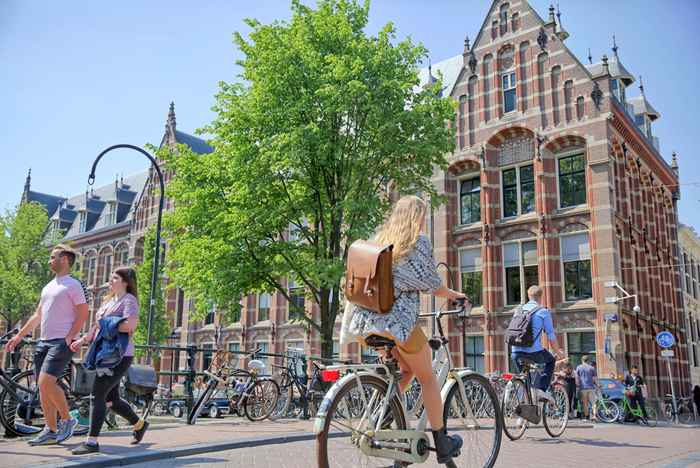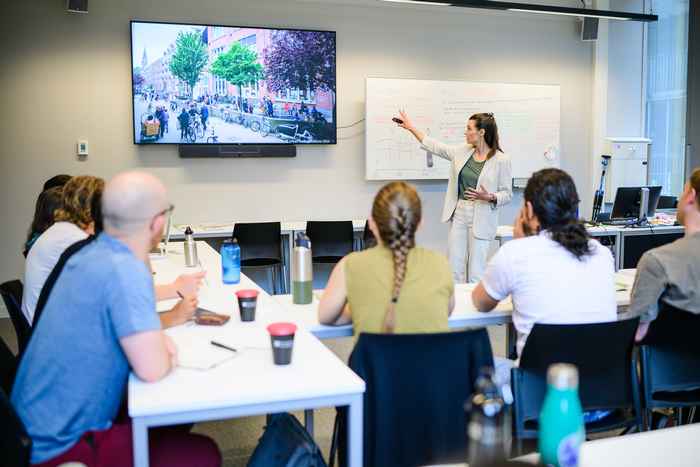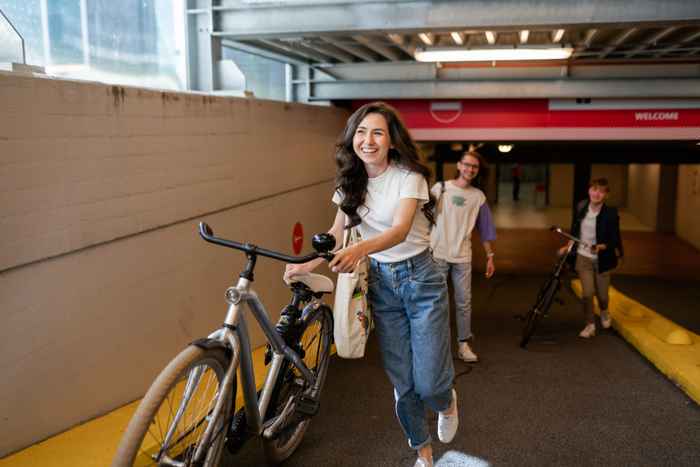Planning the Cycling City
Throughout this three week summer programme, we will use Amsterdam as our living lab to examine the impacts of history, policy, infrastructure, planning, and culture within the context of urban cycling in the Netherlands. We invite students to bring and share their views and experiences on cycling cities from around the world, sharing diverse perspectives, plans, and desires as we work together to plan cycling cities.



-
Programme at a glance
Mode of instruction: On-campus (3 weeks) Academic dates: Thursday 26 June - Wednesday 16 July 2025 Housing dates: Wednesday 25 June - Thursday 17 July 2025 Academic fees:
Student fee:
€1750. Read more about what is included in the fees.
Professional fee:
€2200. Read more about what is included in the fees.
Housing fees: €850 for a private room with shared facilities. Housing is optional. Read more about university-organised accomodation.
Credits: 6 European Credits. Read more about credits and credit transfer. Early admission deadline: Saturday 1 February 2025
Students who require a Schengen Visa to study in the Netherlands are strongly advised to apply before the early deadline to ensure there is enough time to secure a visa appointment before the programme begins.
Regular admission deadline: Saturday 15 March 2025 Who is this programme for? This is an academic programme geared towards current university students and early-stage academic researchers (e.g., PhD students and post-docs) with a curiosity of studying cycling as a case to explore urban challenges. The programme welcomes those studying a range of disciplines, commonly urban planning but also fields in the (social) sciences and/or humanities (i.e., architecture, public administration, law, public health, business, psychology, communications, etc.).
There is a limited number of spots for professionals working in fields mentioned above. Professionals applying should provide reasoning for their participation and demonstrate support from management. Professionals partaking in the programme are required to attend all sessions and complete all readings and assignments, as this is a necessity to keep up with the course content. This is an academic programme, thus the academic directors expect all participants, regardless of background, to maintain the same level of engagement with the course materials.
-
Pre-requisites for the programme
All participants should have completed their Bachelor's degree (minimum), although exceptions can be made for final year bachelor students on a case-by-case basis. All successful applicants will be asked to complete the online course Unravelling the Cycling City. The workload of this online course is about 24 hours. You can sign up to the Coursera platform for a 7 day free trial and subsequently the platform costs $45 per month. Participants are asked to upload a copy of their certificate one week prior to the start of Planning the Cycling City Programme.
-
Programme description
This course follows a flipped classroom approach in which Amsterdam is both a story board and a lab. Experience and experiential learning are key components of the course. Students are encouraged to independently explore and examine the city through the lens of the learning material; to get inspiration, to struggle with concepts or to “translate lessons" to their local context.
The course includes intimate discussions with the absolute leaders in fields ranging from sociology to transport engineering, and including influential academics and practitioners. To develop a rich understanding of a cycling city students engage in fieldwork, excursions, small group discussions and course projects. Seminal and recent contributions to the relevant literature are discussed throughout the course.
The programme will cover topics as diverse as urban cycling (historical and current trends), power relations in policy, strategic planning at different scales, land use, streams and wayfinding, bicycle culture and effects, data collection and measurement, and marketing as a policy instrument.
Participants in this summer programme will also receive a bicycle included in their academic fees. These are true "Dutch bikes" and are simple and effective for commuting throughout Amsterdam, and for the adventurous, beyond on the Netherlands' enormous integrated network of bicyle paths, highways, and infrastructure.
-
Academic team
Lecturer and Co-Founder
Prof. Dr. Meredith Glaser is the CEO of the non-profit Urban Cycling Institute and Professor of Sustainable Mobility, holding the Chair of Cycling at Ghent University Department of Geography. She is also a lecturer in urban planning at the University of Amsterdam. Her research focuses on policy innovation, knowledge transfer, and capacity building for accelerated implementation of sustainable transport goals, using the case of cycling. She is also one of the world’s most experienced educators for students and professionals seeking to learn Dutch transport planning policies and practices. She is originally from California and holds Masters degrees in urban planning and public health from UC Berkeley, and received her PhD in urban planning from University of Amsterdam, promoted by Prof. Dr. Marco te Brömmelstroet.
Lecturer and Co-founder
Prof. Dr. Marco te Brömmelstroet is Professor of Urban Mobility Futures at the University of Amsterdam and co-founded the Urban Cycling Institute in 2016 within the Center for Urban Studies at the UvA. His teaching in Urban Planning Bachelor and Master’s programs centers around the (problematic) integration of land use and mobility and (de)constructing alternative narratives for urban mobility futures. He has authored numerous academic research articles and co-authored the book Movement.
-
Explore our community
Want to get to know more about studying in Amsterdam? Follow us on social media and join our summer community. Get a feel for our summer school vibe and our academic and social community, and learn about studying with us through the eyes of past summer school students.
Looking for an alumni perspective? Read this interview with Patrick Morgan, who attended Planning the Cycling in 2019.
You can also hear more about the history and culture of cycling in the Netherlands from our Academic Directors George and Marco on our podcast Mokum.
- Mode
- Short-term
- Credits
- 6 ECTS, 3 weeks
- Language of instruction
- English
- Starts in
- June